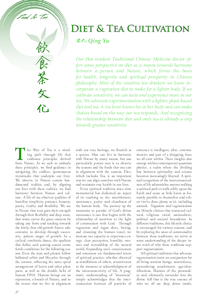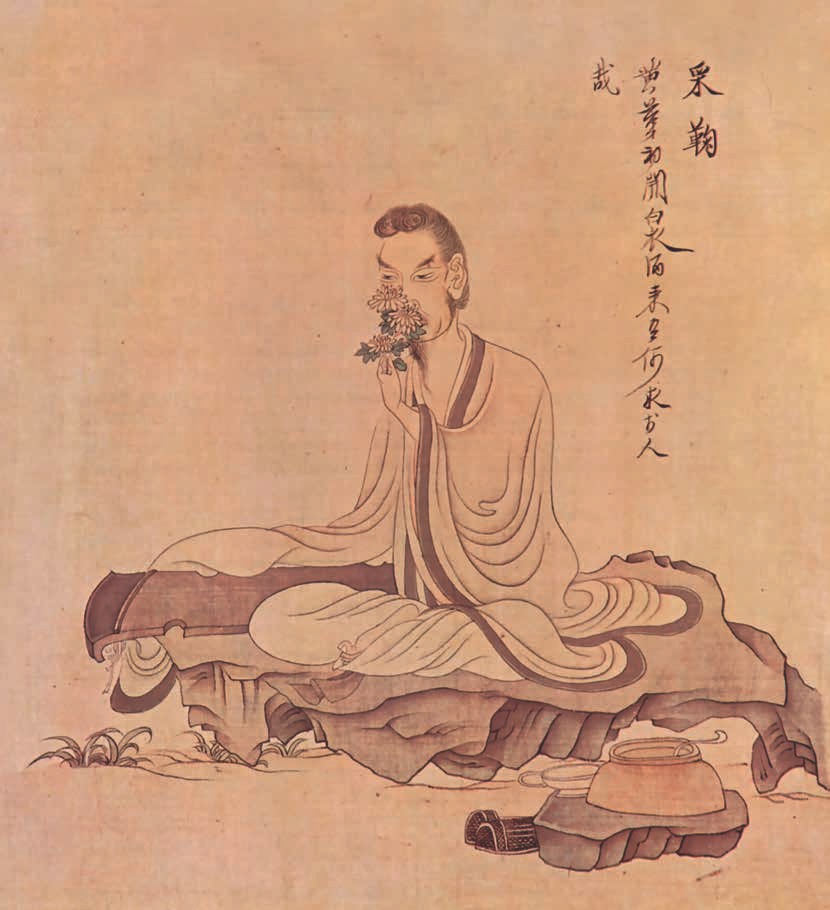
 |
|
The Way of Tea is a winding path through life that embraces principles derived from Nature. As we seek to embody these principles, we find guidance in navigating the endless, spontaneous vicissitudes that underpin our lives. We observe in Nature certain fundamental realities and, by aligning our lives with these realities, we find harmony between Nature and culture. A life of tea observes qualities of humility, simplicity, patience, honesty, purity, vitality and flexibility. We see in Nature that trees gain their strength through their flexibility and deep roots, that water carves the great canyons by taking any form and tending towards the lowly, that old-growth forests take centuries to develop through successive, patient stages of growth. In a cyclical, symbiotic dance, the qualities that define each passing season create fertile conditions for the following season. Even the stars and planets follow hallowed orbits and lifecycles through the cosmos, reflecting the same spiral arrangement of leaves and other plant parts, as well as the double helix of human DNA. Human beings are an expression, a breath of Nature, and to the extent that we live in alignment with our true heritage, we flourish as a species. Man can live in harmony with Nature by many means, but one particulary potent way is to observe the seasons and the foods that one eats in alignment with the seasons. Diet, which includes Tea, is an important way we can align ourselves with Nature and maintain true health in our lives.
Every spiritual tradition since time immemorial has dedicated an aspect of its teaching to the nourishment, sustenance, purity and cleanliness of the human body. The journey up the mountain to partake of God's divine sustenance is one that begins with the relationship of nutrition to the light of communion with God. Through vegetarian and vegan diets, fasting, and cleansing the human vessel, we increase our capacity to experience energy, clear perception, humility, oneness and stewardship of the natural world. Expanding one's consciousness and awareness are fundamental tenets of spiritual practice, whether observed as mindfulness of others, attentiveness to the moment or acknowledgment of the interconnectivity of life. A pragmatic understanding of "awareness" simply acknowledges that the interconnection between all particles of existence is intelligent, alive, communicative and part of a designing force we all exist within. These insights also emerge within contemporary quantum physics, a realm where the dividing line between spirituality and science becomes increasingly blurred. A spiritual recognition of the interconnectedness of life admonishes anyone walking a spiritual path to walk softly upon the Earth and cause as little harm as humanly possible to themselves and others (we've done plenty as is), including animals. Veganism and vegetarianism are lifestyle choices that transcend cultural, religious, racial, nationalistic, political and societal boundaries. In different traditions, this lifestyle choice is encouraged for various reasons, and by exploring the areas of commonality between these traditions, we arrive at some understanding of the deeper inner truth of why these traditions support vegetarianism.
A human being is part of a whole, called by us the "Universe," a part limited in time and space. He experiences himself, his thoughts and feelings, as something separated from the rest - a kind of optical delusion of his consciousness. This delusion is a kind of prison for us, restricting us to our personal desires and to affection for a few persons nearest us. Our task must be to free ourselves from this prison by widening our circles of compassion to embrace all living creatures and the whole of Nature in its beauty.
All spiritual traditions that advocate vegetarianism insist on compassion for all living sentient beings, nonviolence, surrendering attachments, ego-identifications, illusions of the personality, and, ultimately, surrender into the divine Self that is the true essence of who we all are deep down inside. This process of surrender and "widening our circles of compassion to embrace all living creatures," to borrow from notable vegetarian Albert Einstein, is one that requires profound inner work and sublimation of our lower impulses and desires. By overcoming our animalistic impulse to consume meat and flesh, we undergo a process of sacrifice, and in surrendering our lower Nature, loosening the grip of our ego, and more fully embracing the sacred interconnectedness of life.

Generally, a vegetarian diet is ideal for a tea person because it promotes sensitivity of palate, greater awareness of energy or Qi, cleanliness, purity and stillness of mind. The hormones released in animals during the modern process of slaughter disrupt the equipoise of the person who consumes the meat. Furthermore, the act of slaughter is an ugly act. The Way of Tea is a way of beauty and refinement; thus a tea lover must choose to live in a way which values beauty for its own sake. Besides, 68% of all diseases in the U.S. are diet-related. We spend over $135 billion dollars annually in the U.S. to treat cardiovascular disease and heart disease is the most common cause of death in the U.S. There is zero cholesterol in grains, legumes, fruit, vegetables, nuts and seeds. Also, 40% of all cancers in the U.S. are diet-related.
Throughout the ages, spiritual teachers of many faiths have encouraged vegetarianism for an even more compelling reason. They stress vegetarianism as one of the cornerstones of a successful meditative and spiritual life. It is scientifically proven that all meat products, especially red meat due to its highly acidic composition, affect the body in ways detrimental to meditation and spiritual practice. This insight operates in many ways. The consumption of meat is not conducive to deep meditation or spiritual practice because it affects us on a physiological level, raising blood pressure, increasing degenerative disease, and requiring more energy for digestion, as well as affecting us on a mental and emotional level.
Fat from flesh foods is a major storage site for pesticides, herbicides and other environmental toxins that enter the food chain and that affect the proper functioning of our body and mind. The energy of a flesh-food diet adds to the impurities of the mind and the nervous system. Flesh consumption also disrupts the energetic channels or meridians of the body.
Lao-tzu's Tao Te Ching, or Book of the Way and the Power of the Way, is the classic manual on the art of living. It states: "Man follows the Earth, the Earth follows the Universe, the Universe follows the Dao, and the Dao follows only itself." The cultures that birthed the Way of Tea, believed in complying with, harmonizing and coexisting peacefully with the Earth. Mankind integrates with Heaven and the Earth, and exists in mutual dependence with them. The Dao of the universe does not change, and thus the universe runs according to the Dao in an orderly manner. The Earth follows the changes of Heaven; therefore it has yin and yang, four distinct seasons, five elements, six atmospheres and eight principles that direct change. By respecting Heaven and the Earth, mankind enjoys a harmonious life of gratitude, blessings and growth. This is reflected in the expression "Heaven's favorable timing, Earth's advantageous terrain, and harmony among the people." According to Chinese thought, astronomy, geography, the calendar system, Chinese medicine, literature, and even social structures all follow this understanding. As a microcosm of Nature, humankind also observes the principles of Nature within us. By following the Earth in the way we eat, we live in harmony with the cycles of Earth, which further allows us to live in alignment with the Tao.
Aside from observing a vegetarian diet, this also means familiarizing ourselves with foods local to the area we live and emphasizing them in our diet. Also, by eating foods that grow during that season, we harmonize our bodies and minds to the changes of the Earth. For example, during the dry autumn months, we can incorporate foods that nourish the bodily fluids and lungs such as pears, pumpkin, squash, apples, seaweed, grapefruit, lemon, coconut oil, and olive oil. Additionally, as autumn marks a transition to cooler weather, warming pungent herbs help the body to generate heat that nourishes the lungs such as moderate amounts of pungent foods like garlic, onions, ginger, horseradish, and mustard. Consulting a practitioner of Chinese medicine allows one to determine a customized, seasonal diet most beneficial to one's constitution.
Finally, choosing teas that are seasonally appropriate is a profound way to harmonize with the seasons. For example, aged puerh tends to be more heating and moving, thus having a drying effect on the body. While the meditative states induced by puerh are appropriate for the introverted winter months, one may choose a less drying tea for the autumn. Choosing teas like mid-aged sheng puerh, younger shou puerh and roasted oolongs are more suitable for the autumn. As one becomes more familiar with the effects of different teas on the mind and body, one can make more seasonally appropriate choices.
As a human activity, the Way of Tea marks the noblest of artistic endeavors: the alchemical process. This way acknowledges that life, as well as the man or woman through which life breathes, is an impermanent, constantly fluctuating process. We are unable to define a person with words because words will only tell us about someone, never capturing their essence, their full truth. A human is a process of perception, interacting with a world of forms in an endless display of action and reaction. This process, involving all the mental, emotional, physical, physiological, sexual and energetic functions, happens without volition or consent. Life happens, and we are swept along the river of shifting, swirling eddies. We have little control of our lives because we do not understand this process we call a "self." We rarely objectively observe our emotions, our discursive thinking, our physical sensations, our cravings and aversions, or the real energies at play in a given moment.
Consequently, we live, become conditioned by, and transition out of life according to the whimsical eddies of whatever appears before us. Yet within the human spirit exists an exquisitely clear, sublime and beautiful voice calling us to a higher order of reality, one wherein we participate more fully in the Being and creative blossoming of life. The Way of Tea echoes this voice, calling for our Presence, beckoning us to experience the unfolding of life within us. This Way serves as a bridge between the numinous and the prosaic, as a refined yet supremely natural art of self-realization. The extent to which we follow Nature, knowing that we too are Nature, is the extent to which we create space for this realization to actualize.
One of the most powerful ways that we can harmonize with life on Earth is to adopt a vegetarian diet that emphasizes seasonal, local, organic foods. A profound way to share our cultivation, to bring peace to other's lives, to celebrate beauty and ritual, is to share seasonally appropriate teas in a ceremonial way. These two transformative practices alone create fertile conditions for peace within society and the emergence of enlightened culture.

